Top 15 Ways to Prevent Cancer
Cancer is a scary disease in the public eye, something that comes as a sudden
and surprise diagnosis and that doubles as a death sentence. But that image of
the looming, terminal cloud is no longer an accurate one with modern medicine.
Many cases are survivable, and many more preventable. Research and technological
advances have made cancer a much better understood phenomenon. You may already
be aware that cancer is out of control growth due to cellular damage that occurs
from a multitude of factors, some from your environment and some may be hiding in your
own DNA.
Cancer Cells

While thereís not much you can do about your genetic propensities,
there are definitely ways to shift your lifestyle that will keep you in tip top
shape down to the molecular level.
15) Get Regular
Medical Care
So this is less about preventing cancer from occurring and more about
catching it early, which is just as important to your health. Screenings, exams,
and even self-examinations are all part of the comprehensive care needed for
early detection and optimal treatment of cancer. For instance, the American
Cancer Society encourages women to begin monthly self-examinations, which
includes palpating your breasts to understand their natural topography and to be
able to note changes in consistency, appearance, location, and size of any
lumps.
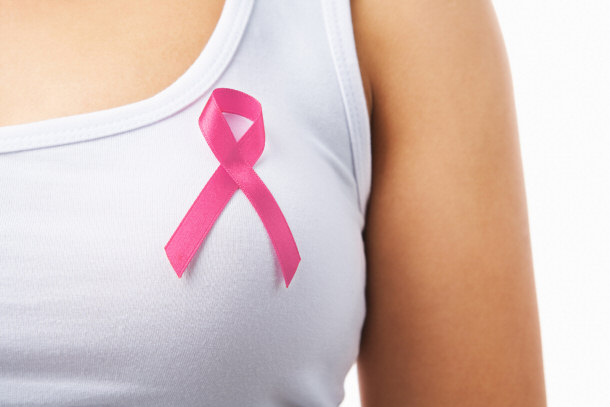
Being able to report what you regularly feel to a doctor will help them
assess whether something needs to be checked out further.
Mammography Test
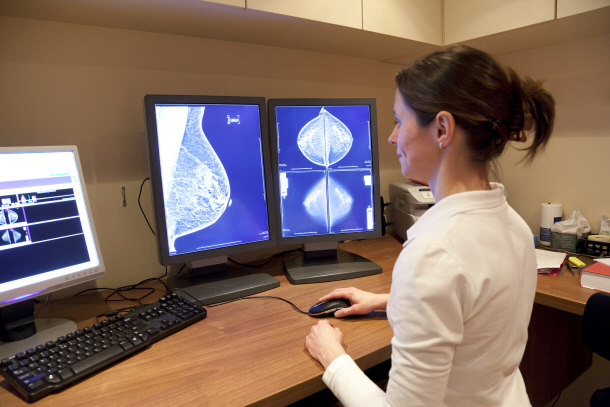
At 40 and beyond, mammograms are recommended. Additionally, everyone is
advised to begin colorectal screenings at age 50. Women as young as 21 are
advised to screen for cervical cancer through PAP tests. Men are advised to talk
to their doctor around middle age to determine if prostate screenings are
necessary. These procedures can seem invasive and uncomfortable, but early
detection is still a key to success in the treatment of cancer and prevention of
its metastasizing in your body, leading to a more serious diagnosis.
14) Get Immunized
These are fairly specific vaccines in this case to guard against hepatitis B
and some types of human papilloma virus (HPV). Hepatitis B is a virus that,
among other things, causes extensive liver damage. This damage can lead to liver
cancer. Any adult can obtain the vaccine if they choose, but it is recommended
most for high-risk individuals who are likely to come in contact with infected
fluids. These include: health care and public safety workers, non-monogamous
sexually active adults, those who engage in unprotected sex, people with
sexually transmitted infections, and drug users who share needles.

Human papilloma virus can be transmitted several ways depending on its type,
but the most worrisome strains are those contracted primarily through sexual
contact. They often cause recurrent cases of warts and lesions on genital areas
in both sexes, though some instances of the disease are completely silent, or
asymptomatic. The HPV vaccines are most recommended for teenage girls and young
adult women, but as the types of HPV that cause cancer are likely to cause
precancerous anal lesions and genital warts in males as well as females. The
vaccine is available to anyone from age 9 to 26.
13) Pick an Experienced Doctor
There is something to be said for young, new doctors that are passionate
about their field and handily up-to-date with the latest word in medicine. But
for things like cancer, it sometimes pays to go old school. Older, experienced
doctors have had more opportunity to learn detection methods first hand, and
they generally conduct examinations of possible signs of cancer in a thorough,
pragmatic way. Those new to the profession can easily miss unusual or anecdotal
symptoms of cancer that textbooks may leave out, but time in the profession has
made plain as something to suspect and further test. Further, established
doctors will have a more expanded network in the area, and be able to advise you
on your options for a specialist or treatment center that will best be able to
help you should the need arise.
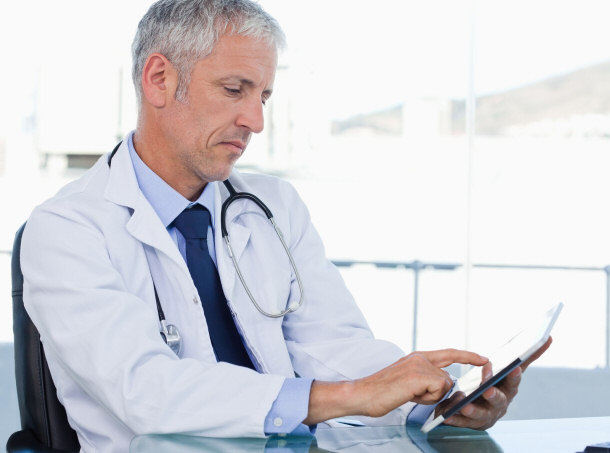
While this is less important in a GP, when you choose a radiologist for those
screenings and tests, definitely keep these ideas in mind. The University of
California showed in a study that doctors with 25 years of more experience gave fewer
false positives and pinpointed results more accurately than those with less
under their belt. While the younger ones need the practice to improve, this is
your health, after all.
12) Spend More Time with Friends
Prostate cancer carries a particular marker for its probably development:
PSA, or prostate specific antigen. The State University of New York recently
found that men who donít maintain satisfying relationships with a support
network of friends and family and who are involved in high stress work usually
have high levels of PSAs. While no direction correlation is made between
satisfying contact and lowering of PSAs, think about the fact that high stress
levels with no outlet to lower them also lead to cellular damage from a variety
of other hormones including cortisol, which is an indirect culprit behind weight
gain and sleeping problems.
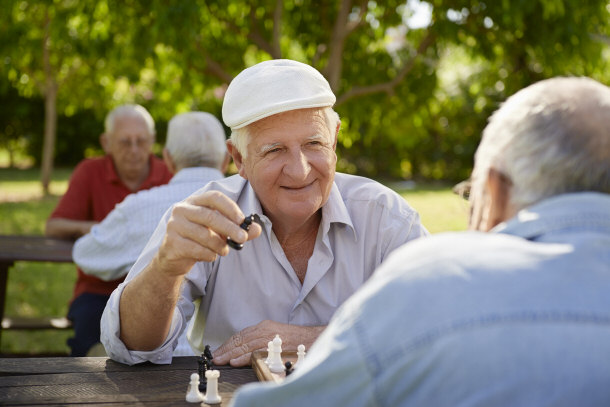
Long term stress can also increase the risk of heart disease and stroke.
Adding all these factors together, thereís no reason not to make that trip with
your favorite fishing buddies, or surprise your spouse with a get-away weekend.
Or even both! Life is short, even when you can manage to stay cancer free.
11) Donít Top Off Your Gas Tank
This one comes to you courtesy of the EPA, whose job it is, among other
things, to evaluate potential carcinogens arising from environmental conditions,
including consumption and use of fossil fuels. That extra shot of gas when you
fill may round out your bill nicely, or ensure you really get that full tank
youíre after, but is it really worth the risk of developing cancer?

You might think the worst that could happen is a little spillage, but bucking
the machineís automatic shut off increases your risk because it overrides a
variety of modern safety controls, including the pumpís fuel vapor recovery
system. Gasoline contains hundreds of petrochemicals that are only organic in
their chemistry, not their health status. The present hydrocarbons are volatile,
which is why you want them for fuel in the first place, and can easily react
with the air around you and with your body when you inhale them. According to
Air Pollution Control in Vermont, breathing in those vapors too often can cause
kidney and blood damage, development disorders, and - you guessed it - cancer.
Add this into the fact that gasoline vapors from misuse of pumps at filling
stations contributes to air pollution and malfunction of pumping stations, and
you have plenty of important reason to practice good citizenship and obey pump
etiquette.
10) Buy Organic
Organically grown foods,
on the other hand, are extremely safe, and as good a way to prevent cancer as
certain organic molecules can cause cancerous cells. Many
people already buy
organic produce to avoid contact with pesticides or out of
fear of GMOs - genetically modified organisms, usually crops. GMOs are
controversial, and, just because they are regulated and approved by federal
authorities, does not clear them in the publicís eye. They have a relatively
short agricultural history and no assurances as to their safety. Could something
that is genetically engineered cause cancer? The jury is still out, and thatís
why for now, some people just arenít biting. Shoppers know the compounds in
pesticides stay viable for a long time and increase in potency with their
continued consumption. Itís a case of better being safe than sorry.

Additionally, animal products that arenít organic may still have traces of
antibiotics or contain growth hormone. Recombinant Bovine Growth Hormone or rBGH
has not been definitely proved to cause human abnormalities, but it does cause
an increase in udder infections in the cows that are administered this hormone. The hormone
itself only appears in animal products in small quantities, but the
possibilities of harm have consumers worried, particularly as anything that
could speed growth and development. RBGH has the potential to set off a wild chain reaction of growth seen in cancer cells.
Once again, youíre out of proven waters here, so use your best judgment.
9) Avoid Dry-Cleaning
There are greener solvents to use in the dry-cleaning process, such as carbon
dioxide, but many dry cleaners still use perchloroethylene or PERC for short.
PERC is excellent for dissolving stains and preserving delicate fabrics. The
problem with the solvent is that it is volatile and dangerous, particularly to
the workers having to breathe it in constantly while on the clock. In 2008, at
the EPAís request, the National Academy of Sciences reviewed the health risk of
PERC, and found it "likely" to be a carcinogen, or cancer causing agent, as well
as a nerve agent that could cause brain damage with prolonged exposure.
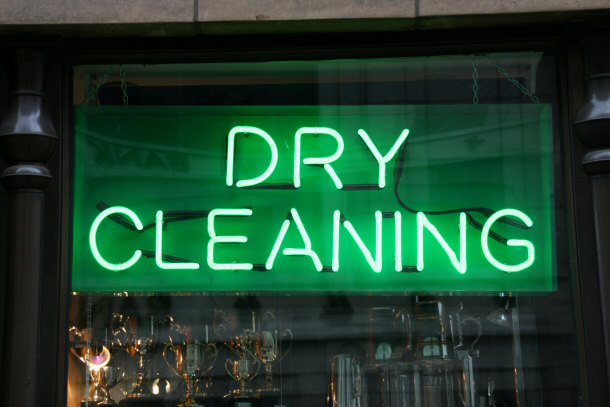
What is the danger to consumers? Not all the traces of PERC stay behind at
the dry cleaners. PERC has been found in clothes cleaned in another manner since
their last dry cleaning, in soil and air samples, and many other places in the
environment it doesnít belong. While this is partly due to PERCís use in other
industrial applications, if you can find a way to avoid this chemical, you
should do so.
8) Take a Calcium Supplement
While conclusive causation has not been established, in 2007, the World
Cancer Research Fund/American Institute for Cancer Research published an
exhaustive review of the latest research concerning the relationships of cancer
with food consumption, nutrition, and other physical factors. This organization
agreed with a recent Dartmouth study that found proper intake of calcium
corresponds to fewer instances of colon polyps, which are the precursors to
colorectal cancer.
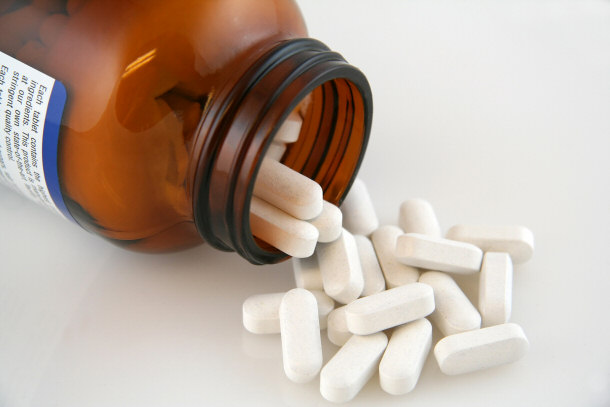
Calcium also builds bone mass, and in post-menopausal women, there could also
be a relationship between taking calcium supplements with vitamin D and a lower
instance of all cancers. Considering calcium plays an important role in
everyoneís skeletal, muscular, and even nervous system, shouldnít you keep on
drinking your milk?
7) Indulge in Garlic
Garlic has been touted for some time as a natural way to guard your heartís
health and improve your physical well-being. Through common anecdotal cases,
some individuals with heart disease and diabetes have found garlic to be a great
way to lower their cholesterol. Garlic, onions, and scallions have been highly
prized culinary herbs for a very long time, and with the latest findings, arenít
likely to leave our tables any time soon.
Fresh Garlic
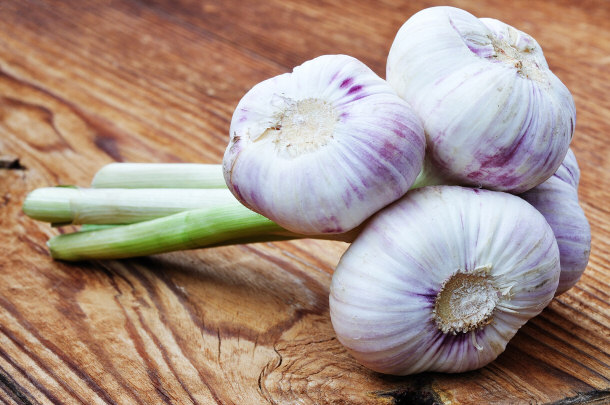
Onions are high in vitamin C, and all
onion, garlic, and scallions are rich in bioflavonoids that are known to
stimulate the bodyís natural immune responses, and may fight against cancer.
6) Eat Selenium Rich Foods
This might be the best reason to save your pumpkin seeds - or maybe youíd
rather toast Brazil nuts. Either way, foods that are high in selenium appear to
be cancer fighters. While research results from studies of the effects of
selenium on some types of cancer, such as liver cancer, remain inconclusive, the
National Institutes of Health have released studies that show a pronounced
reduction of incidence of cancer among individuals with elevated selenium
intake. The most interesting impact of dietary selenium might be in the area of
prostate cancer, which is found to have the strongest correlation in reduced
risk with increased selenium intake.
Pumpkin Seeds

Selenium is found in many tasty foods considered delicacies, from the
aforementioned nuts and seeds to shellfish, salmon, sunflower seeds, shrimp, and
even bacon. Selenium deficiency, meanwhile, hasnít been proven to increase risk
for cancer, but it does affect joint health, and lead to weak hair and
fingernails. Thatís why selenium is something you should go a little nuts over.
5) Watch How You Grill
Remember the compounds from the gasoline vapors? Hydrocarbons are an integral
part of modern life, but they are not always our friends. In particular, two
types of organic compounds called heterocyclic amines (HCAs) and polycyclic
aromatic hydrocarbons (PAHs) can cause irreparable damage when consumed in large
quantities. Youíll find HCAs and PAHs at their highest levels in fatty meats
that have been cooked to well-done or burnt on the grill. They come from fats
and juices that seep out of cooking meat and fall into the fire, causing it to
flare up and belch smoke. While some feel this improves the flavor, it also
speckles your burgers and brats with carcinogens.
Grilling by itself is still a very healthy way to prepare foods, so you donít
have to give it up so much as you might have to change a few habits. If you
choose leaner meats or trim away excess fat before grilling, you can prevent
some of the drippings that will create the problem, for instance. Flipping more
frequently can also stop HCAs and PAHs from building up in meat. The American
Institute for Cancer Research also found that marinades can act as a barrier
between your meat and carcinogenic compounds from the fire, and recommends
marinating meats for 30 minutes, or applying thick sauces. Make sure to stock up
on your favorite BBQ.

The Institute also recommends shortening grilling time to shorten exposure to
HCAs and other compounds. Brown meat in a pan or partially cook it in a
microwave to accomplish this, just letting the grill do the finishing touches.
Additionally, stick with thin cuts of meat, and meats that cook more quickly
like fish, or even non-meat products like veggies and fruit. You can also keep
your grill at a lower setting, and put not just your veggies but your meats as
well on perforated foil to keep the incidence of splash back down from the
flame. Above all, always clean your grill after use to avoid a buildup of
harmful compounds ready to strike your next meal.
4) Steam Vegetables to Preserve Nutrients
While many experts will tell you that steaming vegetables means not
microwaving them, that isnít necessarily true. The point here is balance the
amount of liquid you use, and preferably to use a glass or ceramic vessel made
of nonporous molecules that wonít heat along with your cooking. Steaming
vegetables preserves the most nutrients, far more than boiling or heating dry.
Boiling often leaches nutrients, the Health Beat at health.harvard.edu finds,
particularly delicate compounds like glucosinolate in broccoli that holds
cancer-fighting properties. While nutrient rich boiling water can be used for
soup stocks to retain value, some of the nutrients will simply be lost in the
cooking process. In microwaving, allowing the microwaves to directly rotate the
molecules of water within the veggie itself to heat your food is likely to do
the same thing, encouraging breakdown and leaching of important nutrients that
are then vaporized.
But steaming vegetables - whatever your heat source - allows
the friction of heat to build up in the surrounding water and then work on the
food to raise its temperature. In this way, the least amount of damage is caused
to the produce, particularly the dark leafy greens so prized for reducing risk
of cancer and other diseases.
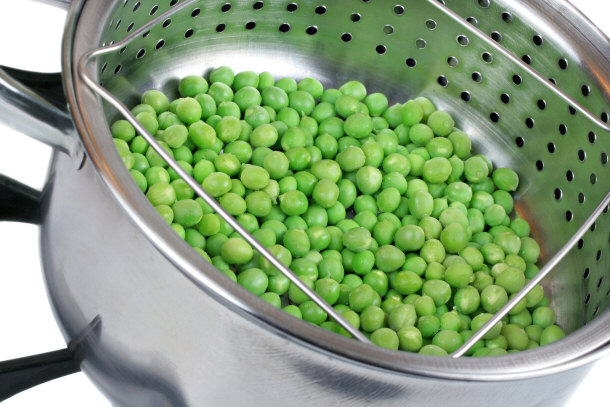
The only healthier way to eat your veggies? Straight up raw! And you can take
in more than you know that way. Eating veggies raw is the only way to make sure
that you are getting the entirety of the nutrients present in whatever vegetable
you are eating. For instance, many consider spinach to be much
more flavorful and palatable in raw form, when tossed in salads as if it was a
lettuce.
3) Be Fit
You knew this would be on here somewhere. Staying active to reduce cancer
risk has been all over the news for nearly ten years, but too many people have a
habit of downplaying how important this really is, not just for cancer
prevention, but overall health. Itís easy to make excuses and find ways to
simply not exercise. If youíre trying to avoid cancer, thereís no avoiding
exercise in that exercise is one of the most important prevention methods for
all types of cancers.

First, sufficient physical activity and a healthy diet are key players -
outside of genetics - in keeping weight in a healthy, manageable range. Obesity
has been increasingly linked to a variety of health disorders, and cancer is
among them. Carrying around a significant pudge causes extra work on bodily
systems, affects metabolism, and can alter cellular metabolic processes, as many
studies have indicated. Further, fat in the wrong places can make some signs of
cancer, like unusual lumps or other evidences of tumors, more difficult to
detect. Extra weight also affects hormone levels and the efficiency of
cancer-fighting agents we do take in from our environment. But even if your
weight is on target and healthy for you, regular exercise can still provide you
with a myriad of health benefits related to cancer prevention. Physical activity
helps regulate insulin and other metabolic hormones, even stress hormones. It
also has a great effect on bowels, reducing inflammation in them and allowing
foods to move more quickly through them, shortening the time that certain
colorectal inducing toxins rest in that area.
Itís never too early or late in life to reap these benefits. Most
experts recommend 150 minutes of activity a week for adults, and this can be in
intervals as short as 10 minutes.
2) Get Moderate Sunlight, but Don't Overdo It
You probably also knew this would be on here, too. Hey, itís proven science. The
harmful UV rays of the sun are streaming down on in ever increasing quantities
as the ozone thins. Luckily, the push for green living and environmentally
friendly advances might someday turn the tide. In the meantime, you have to live
with the fact that big ball of life-giving light is also nuking you as well. A
multitude of studies have proven UV light damages skin cells - deep down below
the layers you see - and that breaks the cellsí DNA. This can lead to molecular errors that
could develop into cancer. Even being careful
to tan instead of burn doesnít help you too much, as that dark pigmentation of a
tan is your body over actively producing melanin in an attempt to halt the
damage. Itís still a sign youíve been detrimentally affected.

A few minutes in the sun each day will not hurt you. In fact it is
recommended that you at least get
some sun exposure for vitamin D, which will greatly help you to prevent
cancer. However, if youíre going
to go out for a long period of time, stay as covered as possible and wear a hat.
And yes, you need
sunscreen. The most common advice for applying sunscreen is
early and often, with an optimal SPF of 45. No matter how high your SPF is or
how waterproof, it will wear off and need to be reapplied in a few hours,
liberally. A common measure of how much to use is the average adult should be
covered with enough sunscreen to fill a shot glass.
1) Ketogenic Diet
Ketogenic diets have been used for weight loss in a similar way to Glycemic
Index diets. They have also been used to treat epilepsy in children. Researchers
working to understand the mechanisms behind this connection between ketogenic
diets and brain function discovered the possibility of suppressing brain tumors
as well.
While research is still pending - like many well-known and popular cancer
prevention measures - ketogenic diets as a way of preventing cancer and even
treating some forms of cancer are thought to work on a very simple principle:
with the diet, you starve the cells of the resources they need to thrive as
cancer agents. In this case, the primary cellular food being restricted is
glucose, as a ketogenic diet requires a low carbohydrate, high protein
consumption. Sugars - found in carbohydrates - are the main fuel source that is
translated to glucose by the body. By restricting glucose, the body shifts what
stores it does have to healthy cells to continue metabolic function, leaving
nothing for the hungry cancer cells that have ramped up their metabolisms to
over populate areas with tumors. Additionally, ketogenic diets emphasize the
consumption of high amounts of beneficial fats that provide fuel to healthy
cells, and avoidance of poorer fats that encourage metabolic irregularities and
tissue build up that can lead to cancer.
Typical Ketogenic (low carb) Diet Meal - Avocado Salad
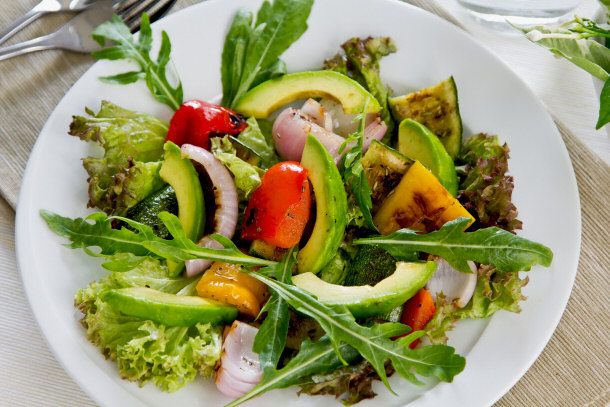
"Ketogenic" comes from the idea of the making of ketones, or small protein
molecules present in a body that is running on a lean metabolism. Generally, the
highest amounts of ketones are found in a body that is in need of more
nutrients, such as an athlete after a workout or someone who hasnít eaten in a
few hours. While this used to be considered a non-healthy state, many are now
wondering if you might be designed to more efficiently run on less instead of
more.
Final Thoughts
Preventing cancer is never a 100 percent sure thing, but there are a lot of
measures we can take to reduce our individual risks and improve our chances of
not just avoiding this disease, but improving our survival should we develop a
malignancy. Incorporating all the latest information on cancer prevention and
early treatment to create a healthier, cancer free lifestyle might feel
overwhelming, but remember to take things in small steps. Each little change you
make is one more impact youíre having on your health, bringing you one lost risk
factor closer to your goal.
General Health
Top 10 Jobs that Cause People to Gain Weight
Top 15 Foods That Help Relieve Arthritis
Top 15 Foods That Improve Eyesight
Top 15 Ways to Prevent Cancer
Top 15 Ways to Improve Your Memory
Top 15 Natural Ways to Improve Your Eyesight
Top 15 Natural Ways to Speed Up Your Metabolism
Top 15 Amazing Facts About Your Eyes
10 Health Problems Caused By Bad Teeth
15 Strange, and Interesting Facts about the Human Body
Why You Should Stop Smoking Now
Bad Habits That Break Down Health |